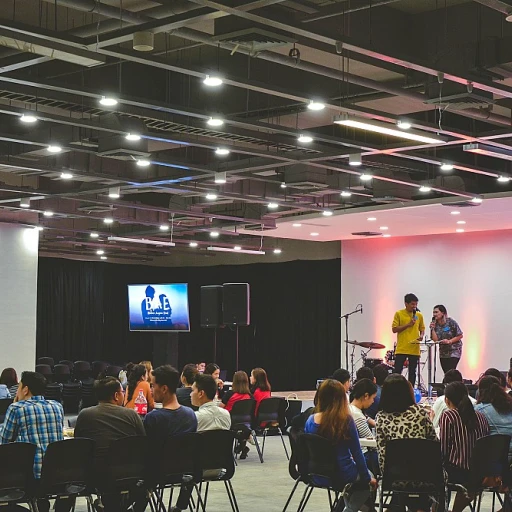The Core Responsibilities of a Substitute Teacher
Understanding the Multifaceted Role
Becoming a substitute teacher involves more than just teaching when the main teacher is absent. At its core, the job requires a flexible approach and ability to adapt to various educational environments. Substitute teachers need to be well-versed in a variety of subjects to effectively manage different classrooms, whether it be a high school setting or a special education class. Their presence helps maintain the flow of the school year, ensuring that student learning continues without interruption.
Moreover, a substitute teacher's job description is diverse, extending beyond simply delivering lesson plans. They must maintain a conducive learning environment, requiring strong classroom management skills. These responsibilities often include supervising students, implementing lesson plans left by the regular teacher, and sometimes creating plans on the fly.
More Than Meets the Eye
Substitute teaching involves managing unforeseen challenges. For example, substitutes may have to work without the ideal classroom equipment or resources, necessitating creativity and adaptability. Regardless of the circumstances, they must foster a positive environment where students can focus and learn effectively. This entails an ability to engage on both an oral and written level to facilitate understanding, ensuring that education goals are achieved.
Additionally, the role implies readiness to fill gaps as needed, on a limited basis, sometimes with little notice. This requires a flexible schedule and a willingness to work with what is available, often tapping into a deep well of resourcefulness to meet the job's physical requirements.
For an even deeper dive into other aspects related to substitute teaching and how technology can support this role, one might look into
how HRIS systems facilitate classroom management in educational settings.
Essential Skills and Qualities for Success
Key Attributes for Effective Substitute Teaching
Substitute teachers are essential professionals in the education system who step in to ensure continuity of learning when regular teachers are unavailable. To excel in this role, certain skills and qualities are paramount for creating a positive learning environment and effectively managing a classroom. This section explores the core competencies that substitute teachers need to navigate the challenges of their job effectively.
Essential Skills for Substitute Teachers
Substitute teachers must possess a set of foundational skills to succeed in their roles. These skills not only help teachers in managing classroom dynamics but also ensure that educational activities proceed smoothly:
- Classroom Management: The ability to maintain order and promote a conducive learning environment is crucial. This involves using effective strategies to handle diverse student behaviors, ensuring all students remain engaged throughout the day.
- Adaptability and Flexibility: Substitute teachers often receive limited notice before entering a classroom setting, making adaptability critical. They must quickly adjust to different school cultures and classroom settings, adapting lesson plans to suit the needs of the day.
- Strong Communication: Effective oral and written communication skills are required to convey lesson plans clearly, interact with students and staff, and complete any required documentation related to the teaching day.
- Organizational Abilities: Given the varied schedules and tasks a substitute teacher encounters, strong organizational skills help manage materials and maintain focus on educational objectives.
Qualities for Success in Education
In addition to skills, certain qualities can enhance a substitute teacher's effectiveness in fulfilling their job description:
- Patience and Empathy: Understanding and connecting with students is essential, especially when working in special education settings or with diverse student populations.
- Dependability: Schools rely on substitutes to fill unexpected absences, so reliability and punctuality are key attributes appreciated by educational institutions.
- Resourcefulness: Quickly accessing and utilizing available resources and equipment optimally supports the realization of lesson plans and addresses any unexpected challenges.
- Preparedness: Enthusiasm and being ready for unexpected developments during a school year help foster a high-quality educational environment.
To thrive in their role, substitute teachers must blend these skills and qualities, thereby enhancing their ability to impact student learning positively and ensuring smooth classroom operations. You can learn more about the complementarity of such roles in education at this
link.
Navigating the Challenges of Substitute Teaching
Overcoming Common Challenges in Substitute Teaching
Substitute teaching presents unique challenges that require adaptability and resilience. In navigating these hurdles, substitute teachers are often faced with uncertainties about classroom dynamics and expectations.
One fundamental challenge is the preparedness to step into different educational environments day after day. Substitute teachers are frequently required to fill roles in various subjects and grade levels, oftentimes with limited prior information. This requires an ability to quickly assess each situation and adapt accordingly, ensuring that the learning environment remains conducive to student learning.
Classroom management is another significant hurdle. Substitute teachers must establish authority and rapport with students who may be unaccustomed to their presence. Effective substitute teaching calls for skills in both oral and written communication, ensuring that instructions are understood and followed, and that any required lesson plans are properly executed.
The diversity of situations encountered in substitute teaching can also present logistical challenges. A substitute may work in different schools across a district, needing to familiarize themselves with the particular systems and procedures of each institution. Familiarity with school equipment and resources, and the ability to navigate various administrative tasks contribute to a smoother experience.
In addition to daily obstacles, substitute teachers must be prepared to address unique needs in special education settings. This requires a keen understanding of individualized education plans (IEPs) and the ability to provide tailored support.
As education systems evolve, human resources information systems (HRIS) offer promising solutions to some of these issues. For example, optimizing administrative efficiency in HR systems can streamline the processes for tracking substitute teacher assignments, ensuring better preparation and less confusion for all involved parties. This can greatly improve the overall experience for substitute teachers and students alike.
While the job description of a substitute teacher emphasizes flexibility and quick thinking, the ongoing development of skills and strategies will continue to support their success in each school year.
The Impact of Substitute Teachers on Student Learning
Influence on Student Development and Achievement
Substitute teachers play a vital role in shaping the student's educational journey. Their contributions, though often deemed temporary solutions, should not be underestimated. With the ability to fill in seamlessly, these educators ensure the continuity of the learning process on any given day. By maintaining a positive learning environment and following the lesson plan laid out by the regular teacher, substitute teachers provide the stability that is required for student learning.
Maintaining Classroom Momentum
The effectiveness of a substitute teacher is largely reflected in their ability to sustain the rhythm of the classroom. Students thrive in routine and consistency; thus, substitute teachers must adapt swiftly to varying lesson plans and classroom dynamics, whether it's a high school science lab or an early education class. A significant part of their job description is not only abiding by the original teacher's job directives but also demonstrating flexibility and resourcefulness in managing unforeseen situations.
Supporting Diverse Educational Needs
In today's educational landscape, diverse student needs, including those in special education, demand a nuanced approach to teaching. Substitute teachers are expected to navigate these challenges efficiently, applying classroom management skills and ensuring that all students, regardless of their learning requirements, benefit from an engaging and productive educational experience. Their performance can directly influence the school year's goals and students' academic success.
Interpersonal Skills and Professional Development
A substitute teacher's impact on students is magnified by their interpersonal skills and the oral written communication they exhibit in their interactions. These skills contribute to building trust and rapport within the classroom, fostering an ambiance conducive to learning. Continuous professional development, as outlined in their job descriptions, is crucial to refining these skills and enhancing their teaching abilities.
Substitute teaching offers a unique perspective on the education system, calling for a balance between fulfilling short-term needs and contributing to long-term student success. While the challenges are numerous, the impact of substitute teachers is both significant and indispensable, making them an integral component of the educational framework.
Streamlining Substitute Teacher Management with HR Information Systems
Human Resources Information Systems (HRIS) play a pivotal role in efficiently managing the complex landscape of substitute teaching. These systems are essential for schools to ensure seamless operations and enhance the overall learning environment when regular teachers are absent.
- Efficient Scheduling: The ability of HRIS to automate and organize substitute teacher scheduling is invaluable. It helps in efficiently filling in daily classroom needs, including those in high schools, special education, and other departments, minimizing disruption to student learning and maintaining the learning environment.
- Accurate Job Descriptions: HRIS assist in maintaining well-defined job descriptions for substitute teachers, detailing the physical requirements needed, the specific skills and qualities required, and the expectations, ensuring a clear understanding of responsibilities. This aids both the substitute teachers and the administrative staff.
- Seamless Communication: Effective communication skills, both oral and written, are crucial. HRIS facilitate this by providing platforms for rapid communication between teachers, administrators, and substitutes regarding classroom management, lesson plans, and any specific requirements for the day.
- Resource Allocation: Ensuring that substitutes have access to necessary equipment and materials required for teaching is streamlined through HRIS, eliminating any potential logistical challenges, so the focus remains on delivering quality education.
- Performance Tracking: Tracking the effectiveness and performance of substitute teachers helps in enhancing the quality of education. HRIS allow for performance metrics to be recorded and reviewed, ensuring that substitutes meet the educational standards required by the school and contribute positively to the students' learning experience.
By leveraging Human Resources Information Systems, schools can not only address the immediate need for substitutes but also strategically build a reliable pool of substitute teachers who are prepared to meet the school's mission and educational goals throughout the school year. This kind of strategic HR management sustains the educational process and helps in maintaining continuity, even amid the unpredictability of teacher absences.
Future Trends in Substitute Teaching and HRIS
What's Next in Substitute Teaching and HRIS?
The landscape of substitute teaching is constantly evolving, influenced by technological advancements and changing educational needs. Human Resources Information Systems (HRIS) are increasingly playing a pivotal role in this transformation, helping schools manage and support substitute teachers more efficiently.
One of the key trends to watch is the integration of AI-powered tools. These tools have the ability to streamline the process of matching substitute teachers with job opportunities that match their skills, experience, and availability. This can significantly reduce the time it takes for schools to fill vacancies, ensuring that students' learning is less disrupted.
Another emerging trend is the increased use of mobile platforms within HRIS. These platforms enable substitute teachers to access their schedules, job descriptions, and lesson plans from anywhere at any time. This level of accessibility ensures that subs can be better prepared for each day in the classroom, ultimately benefiting students' learning experiences.
Moreover, HRIS are enhancing their classroom management functionalities by including features such as real-time feedback tools. Such features allow substitute teachers to report on the classroom environment and student engagement at the end of each day. This information can be invaluable to the permanent teachers as they plan for the continuation of learning.
As the educational sector continues to place a greater emphasis on inclusivity and special education, HRIS are adapting to include more specific descriptors for teacher roles. Differentiating between high school, special education, and elementary substitute teachers within the systems helps tailor job assignments more accurately.
Finally, data analytics within HRIS can provide insights into substitute teacher performance and their impact on student learning outcomes. By analyzing patterns in classroom management and lesson plan implementation, schools can make informed decisions regarding substitute teacher deployment and professional development.
In conclusion, as HRIS continue to evolve, they are set to provide unprecedented support and efficiency in managing substitute teachers, shaping the future of education one substitute job at a time.














